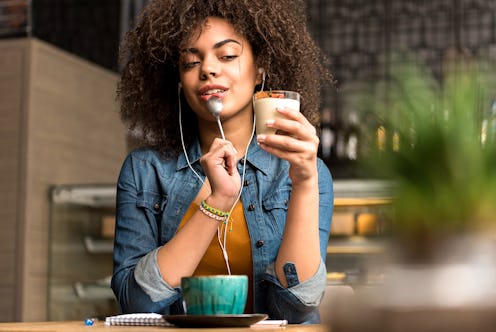(Living)
The Surprising Thing That Could Be Triggering Your Anxiety — And How To Get Rid Of It

While diet fads still come and go, there are a few medically accepted, universal truths about foods that are either good or bad for your health. And sadly for those of you with a sweet tooth, an excess of sugar is in the latter category. You've likely accepted — albeit a struggle — that it's time to cut down on the sweet treats, but do you know exactly why doctors and wellness gurus believe they're harming you? Well, one major reason could be the sugar and anxiety connection. According to the experts, there's a clear parallel between the two, and hearing the science behind it just might be the final straw that helps you kick the habit for good.
You've seen firsthand the way too many sugary cocktails can affect your skin, and you've probably already noticed that over-indulging on candy, cake, and super sweet drinks (like soda) can throw your energy levels out of whack. But besides all that, there's scientific proof that your sugar addiction might also be giving you major anxiety, which in turn affects your quality of sleep and even more serious health issues.
"Sugar raises your blood sugar levels much like caffeine," says nutrition and wellness coach Dana Kofsky of Wellness Styled. "When you are on a sugar high, some people can experience feeling anxiety due to the blood sugar increase. What goes up must come down, so after the high you crash. Some crash harder than others, which can cause irritability and mood swings, which can also cause anxiousness."
Not only that, but as board-certified Preventive Medicine and Public Health physician Dr. Irving A. Cohen explains, there's a cyclical effect once you develop a dependency. "When our brains are depending solely on sugar for fuel, as that level drops it is natural to produce a small amount of anxiety as a signal that it is time to eat," he shares. "As we eat and our sugar level goes up, just the opposite occurs and we feel better."
Because of that effect, it's a slippery slope. "Yes, that candy bar will satisfy and calm you, but it will also make your body produce a large upsurge in insulin level to smooth out the sugar rush," Dr. Cohen explains. "This, in turn, may overshoot with the result that there will be a rapid downswing, again triggering that anxiety and need for more 'comfort food.'" And once you're regularly consuming foods that are high on the glycemic index, the physician explains you're also more at risk for health issues including Type 2 diabetes.
While the solution of staying off sugar seems obvious, it's easier said than done. And it's also important to note that total elimination of sugars isn't necessary. Instead, as Kofsky suggests, try sticking to foods with naturally occurring — as opposed to added — sugars when you're craving something sweet.
Even still, both experts say to watch your intake of naturally sweet foods as well. "Naturally occurring sugars are better but it’s still advised to proceed with caution," says Kofsky. "The recommendation that I tell my clients is to eat one serving of fruit a day and avoid added sugars. I [also tell them] to eat fruit with a fat to help stabilize blood sugar levels [and] help fight the spike-and-crash."
And Dr. Cohen also notes that if you think sugar could be contributing to your anxiety levels, make sure to carefully read the labels — checking for hidden sugars and substitutes that may be just as bad for you. And if you're a soda or avid fruit juice drinker, cutting those alone could make a huge difference. "Simply avoiding sugar-sweetened beverages will be a big step in this direction," he says. "Be careful, there are natural fruit juices that may contain as much or more sugar than soft drinks!"
As for the alternatives, while Kofsky notes that brown rice syrup, sucrose, barley syrup, corn syrup, fructose, and evaporated cane juice are all just sugars in disguise, there are a few substitutes that are a bit better. For example, plant-based monk fruit and stevia are less likely to cause the spike-and-crash effect, but you'll still want to be wary of overdoing it on them. Instead, follow Dr. Cohen's advice and limit all sweet treats to special occasions. "Following a low glycemic index diet can do the trick," he says of the step to helping lessen anxiety triggers. "That means avoiding foods that make your blood sugar go up of rapidly."